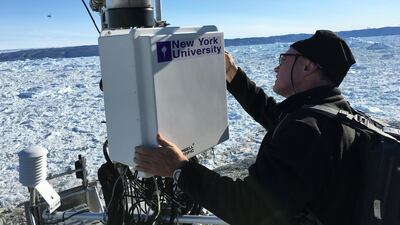Two Abu Dhabi scientists are taking part in a PBS documentary on climate change that will be broadcast in the United States on April 18.
The two-hour Decoding the Weather Machine visits scientists around the world to understand how the climate system works and how man-made carbon emissions are already affecting our planet.
The crew spent five days filming in Greenland last June with husband-and-wife team David and Denise Holland, leading glaciologists based at New York University Abu Dhabi. Their studies of shrinking glaciers in Greenland and Antarctica are essential for models that predict sea level changes.
They work on the Jakobshavn Glacier, one of the world's fastest-melting glaciers. It produces more than 10 per cent of Greeland's icebergs. It is an unpredictable environment. In 2015, a 12.5 square kilometre iceberg broke off and floated out to sea. Assuming that the ice was about 1,400 metres deep, it would be enough to cover an area the size of Saadiyat Island and Yas Island under 300 metres of ice.
“The last decades have been about atmosphere models and ocean models. Now we’re saying, what about the glaciers?” said Mr Holland, who has monitored ice loss in Greenland since 2007. “That’s next on the agenda but it turns out that they’re really hard to study because they’re in remote places and they’re dangerous.
“Unfortunately, several people I've known in the past decade are dead because of the research done on the glaciers, and you can see why.”
Some of their most informative data is found on ice sheets at the ocean’s edge, where the ice fractures off into the ocean.
The draining of ice from Greenland is accelerating. Glacial retreat could be much faster than thought, triggered by changing winds and currents that bring warm water into contact with the glacier.
The same loss of ice is taking place in Antarctica but on a much larger scale.
The Greenland research is a small piece of the puzzle. Only half of man-made carbon emissions have been absorbed by the atmosphere. Forests and oceans have each absorbed a quarter of man-made emissions and the film spans the globe, visiting researchers in the sequoia forests of the US to the fossilised coral reefs of the Australian Outback. It also visits communities on the front line of climate change.
On the Marshall Islands in the South Pacific, we meet the islanders who may become the world’s first climate refugees.
“We feel really small,” says Kathy Jetnil Kijiner, a Marshall Islands poet, in the documentary. “These floodings are going to continue until we can’t live there any more. We’re hoping to not become nomads. We’re hoping to not become lost.”
_______________
Read more:
Satellites show warming is accelerating sea level rise
Gulf Stream at its weakest point in 1,600 years
_______________
Bringing it home for American audiences, the documentary visits Norfolk, Virginia, where flooding sea levels have risen more than 45 centimetres since the First World War.
In one scene, a Norfolk couple show how they have raised their house by a storey to cope with flooding. "Anyone who doubts [climate change], we invite them to buy all of this property here," the owner said.
His wife pointed at her FJ Cruiser – “I bought a car that has a snorkle.”
Mass youth movements in the US could push government into action on climate change, said producers at an NYUAD pre-screening last week.
"This is not a problem that is going to be solved three generations down the road. It needs to be solved now," said Paula Apsell, an executive producer from the documentary series Nova. "The last thing that people are thinking about is this very long term, seemingly invisible problem. But I want to say, it's not invisible. This is a problem that's now, and that you can see if you open your eyes."
Doug Hamilton, the documentary’s director producer, said: “We need to make sure that people understand not only that climate change is already happening today but that incredibly damaging effects are not far off.
“I mean, any kid under 20 is probably going to live to see what happens. They could experience a world in 2100 where sea levels are a foot higher than today, or eight feet higher.
“People like David Holland are working to develop better projections to help narrow how much we will be affected but it is also important to add that most of the outcome will be determined by how much we reduce fossil fuel use in the next several years.”
The film was shown at NYU's New York campus yesterday and will be broadcast on PBS on April 18 at 8pm. The Hollands will work with producers to make it widely available in the UAE next year.

